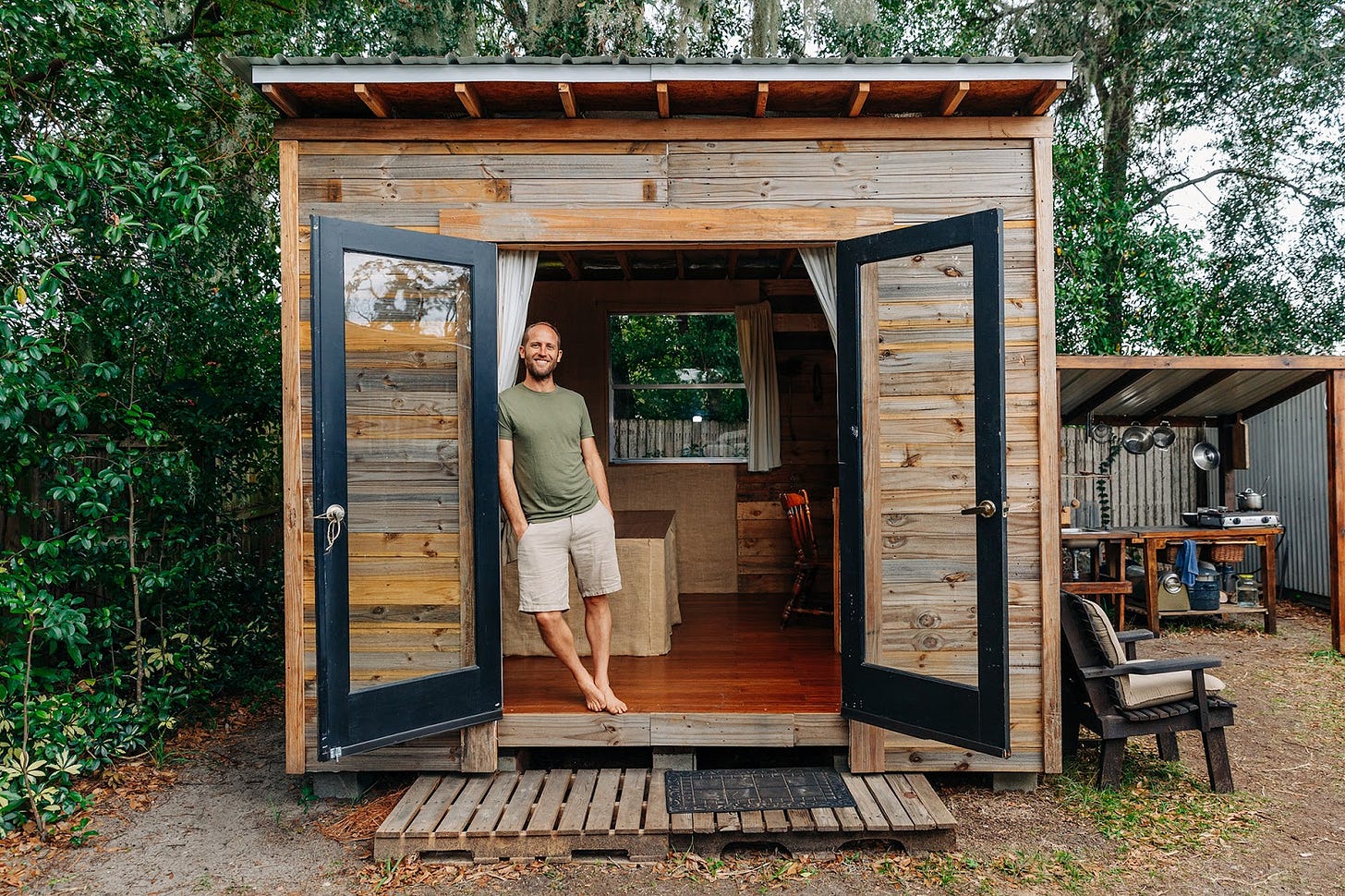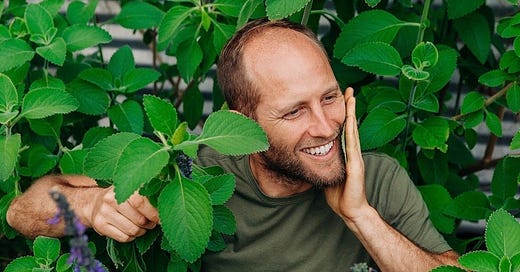Where did your salad fly in from today?
From chocolate to asparagus, your food's carbon footprint may surprise you
Simple climate action at home // I S S U E 9 // F O O D

A taste of the future
By Jemima Kiss
Food is profoundly, deeply comforting. That’s never been more true than this year, when we’ve been deprived of social contact and spending more time at home, and in our kitchens. We turn to food in times of grief or celebration, and we all have our favorite dishes, our go-to desserts, our bring-everyone-together, big-meal specials. And all of these are bound up with nostalgia, aspiration and ritual.
So asking anyone to change their diet is a big deal. We’ve all read about the carbon footprint of different diets, and we know that meat, particularly beef, has a much bigger impact than plant-based diets. Food typically accounts for up to 30% of our household’s emissions, and protein accounts for 83% of those emissions; beef creates 90 times the emissions of the equivalent amount of pea protein.
But as is often the case with climate change, the closer you look the more complex the issues becomes. Chocolate produced from cocoa grown on deforested land has a bigger footprint than the most sustainable beef. An Italian vegan couple who ate a lot of imported, out of season fruit, like strawberries and blueberries, were found to have a bigger footprint than people who ate locally produced meat. Imported Peruvian asparagus has the biggest carbon footprint of any vegetable.
Our approach to a climate-friendly diet has to be better informed, and more thoughtful. As we found with our food waste and plastic packaging coverage, most of us have deeply entrenched habits in what we buy and how we buy it. Some of us may manage to buy fresh product from farmers’ markets or grow a little of our own, but that’s out of reach for many people. We rely on food produced by big agriculture, grown with pesticides that are crippling natural ecosystems and techniques that are generate massive carbon emissions. (If you haven’t already watched the documentary Kiss the Ground, we highly recommend it.)
This month we’ll explore alternatives to big agriculture, and how we need to move beyond organic. Keep reading for a profile of Rob Greenfield, whose imaginative experiments are highlighting our resource-intensive lifestyles, and showing us a different way forward. Lastly, thank you to Substack for our profile this week, and hello to our new wave of readers. As ever, tell us what you think, what you need from us, and share Hothouse with a friend.

Illustration: Jago Silver

The Hothouse Food Challenge
This month, we’ll be experimenting with shifting habits in our diets and food shopping. This is an exercise in impartiality; no judgments, just a gentle, personal observation of what you normally buy to eat for a week.
Do your normal food shop this week.
Note what you buy, whether it’s local or imported, and whether your diet tends to fall into heavy meat consumption, light meat consumption, vegetarian (including dairy), or vegan.
Next week, we’ll suggest how to shift the needle on your diet in ways that feel good, rather than sacrificial.
Lastly, please forward this email to one friend and ask them to sign up. Ask them to join our challenge too.

Rob Greenfield’s experiments with a low-carbon, high-impact life
Not many of us want to live like Rob Greenfield. He has 111 possessions, pedalled a bamboo bicycle three times across the US, ate only food he grew or foraged for a year, and wore all the trash he threw away for a month. This year, his net worth was $2,100.
But until he was 25, Greenfield lived like the average American and wanted to be a millionaire by age 30. Yet he began to see his consumption, and half-hearted efforts to lead a bit less damaging life, as deeply unsatisfying. At first, he made just a few small changes. Shopping local. Eating whole foods. Reusable water bottles. By 2020, he realized that each new step brought more joy and excitement with the comforts and possessions he was leaving behind.
Greenfield says the extreme lifestyle he’s leading isn’t meant to inspire imitation. It’s meant to inspire us to think. We make choices everyday without knowing it. Starting to make a small change allows us to see and create the world that we want.
As told to Michael J Coren

Rob Greenfield with his homegrown toilet paper. Photo: sierraford.com
Ask yourself whether you’re trying to do something to make you feel good, or really trying to solve the big problems of deforestation, climate change, global inequality, global injustice. Those are two very different things. If we are talking about reversing climate change, then something like buying organic food is not even a fraction of what we need to do. Looking at any science and being honest with ourselves, we know that. If we are talking about true solutions then we have to zoom out. We're focusing on mainstream ideas that are presented mostly by large corporations and governments as our only solutions. We have other forms of agriculture that are completely different from [industrial] organic, but are more productive per acre, produce more nutrient-dense foods, and regenerate the land rather than destroy it. They sequester carbon, rather than emitting carbon. Coupling that with localized economies, we're talking about not just having a smaller footprint, but actually being able to produce food on the land in a way that truly regenerates the land and that community around it.
Michael Pollan has this great phrase: eat food, mostly plants, not too much. Those ideas can reach millions of people and get them thinking. Yet the truth is always far more complex. I was vegan for two years from 2014 to 2016, because I thought eating a 100% plant diet was the most sustainable. I continued to educate myself and realized I’d made a huge mistake to think there is a one-size-fits-all solution for 7 billion people. Veganism is primarily a privileged Western way of thinking that actually doesn't analyze the truth for the 7 billion. For many cultures around the world, a plant-based diet is an extinction of that culture. And on another level, transitioning to a plant-based diet is removing people from their ability to live, connected to the land. It's easy to say for most people who live in a city, making plants a larger proportion of your diet is generally going to be more sustainable. But I’m not remotely an advocate for the blanket statement that a plant-based diet is better for everyone. It's so much more complicated than that.

Planting community fruit trees. Photo livewonderful.com
Without changing the political system, we will never have solid change. Politics has to be a part of it. I'm not saying that every individual has to choose to politicize each of their actions, but if we're talking about solving our global catastrophes, then politics plays a massive role.
You've got to start small, but have the information to go deeper. We don't want to give people the false idea that by planting cilantro in their backyard they are solving climate change. But we still want to give them a meaningful thing they can do to improve their quality of life and make a difference. Look at growing your own greens. Washed lettuce from the store actually has one of the highest carbon footprints of any food on Earth, so growing your own food is truly a solution. Another is shopping local, supporting businesses that produce locally, and very organic sharing by talking to your neighbors and asking what they don't have that they could use.

Rob’s tiny house in Orlando, Florida. Photo: sierraford.com
The thing that has held me back the most, and still sometimes does, is social stigma. It's less about the action itself, but the perception of other people around you — going to the grocery store in a town where nobody uses reusable bags. You end up saying no, over and over — I really don’t want a bag! It takes determination because of the stigma in social programming. To live a deeply just and sustainable life requires you to be constantly going against the grain of society. You don't see those people that are doing the same thing as you, and overcoming that was one of the biggest things for me.
Action creates empowerment. You can have all the knowledge, and you can be really intelligent about something, but if you've never taken any action, you feel unable to act on everything you know and believe. Action creates more action, and the actions I see being most successful at helping people are growing their own food, eating healthier, riding a bike and practicing zero waste. But when I take action, I become an empowered human being, and an empowered human being can stand up to the corporations and politicians causing the destruction. An empowered person is much more capable of explaining a point, standing up for what they believe, and of really listening so that we can make that change.

What do you think of Hothouse so far?

Hothouse is a weekly climate action newsletter written and edited by Jemima Kiss, Mike Coren, and Jim Giles. Everything we publish is free to read — your donations fund our work.





